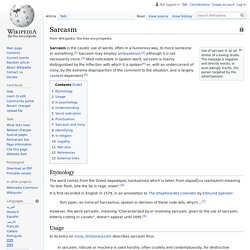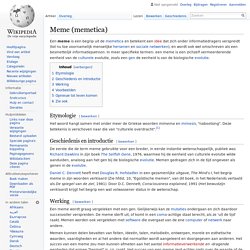

Bewijs uit het ongerijmde. Een speciaal geval van een bewijs uit het ongerijmde is een bewijs door contrapositie.

Een bewijs uit het ongerijmde wordt vaak gebruikt om te bewijzen dat er geen getallen of andere objecten met een bepaalde eigenschap bestaan: men neemt aan dat een dergelijk object wel bestaat, en leidt dan daaruit een onwaarheid af. Vice. Self-pity - Wikipedia. Self-pity is a psychological state of mind.

Description[edit] Though the primary focus of self-pity is on the self and one's own emotions that is within, it also has a strong interpersonal component. Being an interpersonal emotion is directing the emotional feeling or response toward others with the goal of attracting attention, empathy or help. Cynicism (contemporary) - Wikipedia. A 2004 experiment and paper called The Effects of Strategic News on Political Cynicism, Issue Evaluations, and Policy Support: A Two-Wave Experiment found that the way the news media presents the news can cause political cynicism.

The experiment also demonstrated; "a negative relation between efficacy and cynicism suggesting that efficacious citizens were less likely to be cynical about politics. " It was found that straight dry, "issues-based" news did not cause political cynicism, but that "Strategic News" and "game news" did. Absurdism. Absurdism is very closely related to existentialism and nihilism and has its origins in the 19th century Danish philosopher Søren Kierkegaard, who chose to confront the crisis humans faced with the Absurd by developing existentialist philosophy.[3] Absurdism as a belief system was born of the European existentialist movement that ensued, specifically when the French Algerian philosopher and writer Albert Camus rejected certain aspects from that philosophical line of thought[4] and published his essay The Myth of Sisyphus.

The aftermath of World War II provided the social environment that stimulated absurdist views and allowed for their popular development, especially in the devastated country of France. Gallows humor. Gallows humor is humor in the face of or about very unpleasant, serious, or painful circumstances.

Any humor that treats serious matters, such as death, war, disease, crime, etc., in a light, silly or satirical fashion is considered gallows humor.[1][2] Gallows humor has been described as a witticism in the face of – and in response to – a hopeless situation.[3] It arises from stressful, traumatic, or life-threatening situations, often in circumstances such that death is perceived as impending and unavoidable. Gallows humor is typically made by or about the victim of such a situation, but not the perpetrator of it.[4] Nature and functions[edit] Macabre. A death head wearing the Imperial Crown of the Holy Roman Empire, on the sarcophagus of Habsburg emperor Charles VI in the crypt of the Capuchin church in Vienna, Austria.

The Triumph of Death in St Maria in Bienno In works of art, macabre (US /məˈkɑːb/ mə-KAHB or UK /məˈkɑːbrə/; French: [makabʁ]) is the quality of having a grim or ghastly atmosphere. Macabre works emphasize the details and symbols of death. The term also refers to works particularly gruesome in nature. History[edit] The famous series at Basel originally at the Klingenthal, a nunnery in Little Basel, dated from the beginning of the 14th century.
Black comedy. A black comedy (or dark comedy) is a comic work that makes light of serious, disturbing and/or taboo subject matter.

Black comedy corresponds to the earlier concept of gallows humor.[1][2][3][4][5][6] Black comedy is often controversial due to its subject matter. History and etymology[edit] Sarcasm. Sarcasm is the use of irony to mock or convey contempt.[1] "The distinctive quality of sarcasm is present in the spoken word and manifested chiefly by vocal inflections".[2] The sarcastic content of a statement will be dependent upon the context in which it appears.[3] Origin of the term The word comes from the Greek σαρκασμός (sarkasmos) which is taken from σαρκάζειν meaning "to tear flesh, bite the lip in rage, sneer".[4]

Taylor Swift - New Romantics. Anthropomorphism. Personification is the related attribution of human form and characteristics to abstract concepts such as nations, emotions, and natural forces, such as seasons and weather.

Both have ancient roots as storytelling and artistic devices, and most cultures have traditional fables with anthropomorphized animals as characters. People have also routinely attributed human emotions and behavioural traits to wild as well as domesticated animals.[3] Etymology Anthropomorphism derives from its verb form anthropomorphize,[a] itself derived from the Greek ánthrōpos (ἄνθρωπος, lit. Meme (memetica) Daniel C.

Dennett heeft met Douglas R. Some Men Just Want to Watch the World Burn. About “Some Men Just Want To Watch The World Burn” is an expression that is often used as an ironic caption in image macros featuring a rude gesture, faux pas or blatant ignorance of instruction. It has also inspired the creation of the snowclone template “some X just want to watch the world Y.” Origin The phrase began appearing online after it was uttered in the July 2008 Batman film The Dark Knight (shown below) by Bruce Wayne’s butler Alfred Pennyworth (played by British actor Michael Caine) while explaining to Bruce Wayne (played by Christian Bale) that his nemesis, the Joker, is unlike any other criminal Batman has faced. The earliest known image macro containing the phrase as a caption was submitted to Cheezburger’s Pundit Kitchen on March 5th, 2009 featuring a photo of conservative American political commentator Rush Limbaugh.
Spread. Loneliness. Loneliness is a complex and usually unpleasant emotional response to isolation or lack of companionship. Loneliness typically includes anxious feelings about a lack of connection or communication with other beings, both in the present and extending into the future. As such, loneliness can be felt even when surrounded by other people.
The causes of loneliness are varied and include social, mental, emotional or even physical factors. Research has shown that loneliness is widely prevalent throughout society among people in marriages, relationships, families, veterans and successful careers.[1] It has been a long explored theme in the literature of human beings since classical antiquity. Loneliness has also been described as social pain — a psychological mechanism meant to alert an individual of isolation and motivate him/her to seek social connections.[2] Common causes[edit] Misanthropy. General dislike of humanity Misanthropy is the general hatred, dislike, distrust or contempt of the human species or human nature. A misanthrope or misanthropist is someone who holds such views or feelings. The word's origin is from the Greek words μῖσος (mīsos, "hatred") and ἄνθρωπος (ānthropos, "man, human").
The condition is often confused with asociality. Curiosity. Curious children gather around photographer Toni Frissell, looking at her camera Curiosity (from Latin curiosus "careful, diligent, curious," akin to cura "care") is a quality related to inquisitive thinking such as exploration, investigation, and learning, evident by observation in human and animal species.[1][2] Curiosity is heavily associated with all aspects of human development, in which derives the process of learning and desire to acquire knowledge and skill.[3] The term "curiosity" can also be used to denote the behavior or emotion of being curious, in regards to the desire to gain knowledge or information. Absurdism. Nihilism. Cosmicism. We ask you, humbly, to help. Hi reader in Canada, it seems you use Wikipedia a lot; that's great!
It's a little awkward to ask, but this Tuesday we need your help. If you have already donated, we sincerely thank you. We’re not salespeople, but we depend on donations averaging $16.55 and fewer than 1% of readers give. Awe. This Atlanta lightning strike might have inspired awe. One dictionary definition is "an overwhelming feeling of reverence, admiration, fear, etc., produced by that which is grand, sublime, extremely powerful, or the like: in awe of God; in awe of great political figures. Empathy. Empathy is the capacity to understand what another person is experiencing from within the other person's frame of reference, i.e., the capacity to place oneself in another's shoes.[1] Naïviteit. Sadomasochisme. Sadomasochisme (een combinatie van sadisme: plezier in het aandoen van pijn, en masochisme: plezier in het ondergaan en onderdrukken van pijn) is een vorm van seksuele beleving waarin één of meerdere van de partner(s) de ander pijn laat ondergaan.
Paracosm. A paracosm is a detailed imaginary world created inside one's mind. Escapisme. Romantiek (stroming) Tijdens de Romantiek werd de subjectieve ervaring als uitgangspunt genomen. Catharsis (literatuur) Aristoteles geloofde dat catharsis mogelijk was door het geloof in lichaam en geest. Tragedie (toneel) Tragikomedie. Pessimisme. Defaitisme. Empathie. Sadisme. Antisociale persoonlijkheidsstoornis. Nostalgie. Melancholie. Narcisme.